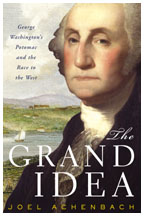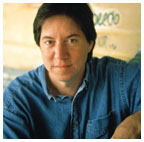October 6, 2004: Reading Room
For his book, Joel Achenbach ’82 retraced part of Washington’s trek along the Potomac River. (Photo by Mark Thiessen) |
Washington’s
race to the West
Joel Achenbach ’82 rediscovers the first
president’s 1784 journey into the wilderness
By Louis Jacobson ’92
When Washington Post reporter Joel Achenbach ’82 looked for inspiration for his recent book, he found it literally a stone’s throw from his house: the rocky, well-preserved bluffs of the Potomac River. All the time he spent going to the river to hike and relax, he says, “I sensed that there was a story lurking amid the rocks and back in the bushes. I thought the river could be like a portal to the past.”
Indeed, it was a portal into George Washington’s past. After the Revolutionary War had ended but before his tenure as president had begun, Washington tried to figure out how the new nation could harness the Potomac as a commercial highway into the rough, undeveloped West. In The Grand Idea: George Washington’s Potomac and the Race to the West, published in June by Simon and Schuster, Achenbach focuses on Washington’s previously little-noticed, 680-mile journey over 34 days into the wilderness in 1784.
The Potomac flowed past Washing-ton’s Mount Vernon plantation in Virginia, and near his swath of landholdings as far away as western Pennsylvania. In addition to looking for commercial opportunities, Washington also journeyed to impose order on his far-flung lands and on his sometimes-rebellious tenants.
 Initially,
Achenbach thought he would retrace Washington’s steps and weave
his own modern-day experiences into the narrative. But after hiking 100
miles over nine days, Achenbach decided to keep himself out of it. “Why
elbow my way onto the stage with George Washington?” he asked himself.
Initially,
Achenbach thought he would retrace Washington’s steps and weave
his own modern-day experiences into the narrative. But after hiking 100
miles over nine days, Achenbach decided to keep himself out of it. “Why
elbow my way onto the stage with George Washington?” he asked himself.
Achenbach admits to knowing little about Washington before beginning his project. Even after five years of research and writing, Achenbach still considers the first president a tough character to crack. “He intentionally created this air of the aloof, magisterial, virtuous man,” says Achenbach.
For Achenbach, the book on Washington offered a change of pace. He took a year’s leave from the Post and spent most of it at Princeton, burrowing into historical collections at Firestone Library and teaching journalism.
The broad historical sweep of The Grand Idea was a departure for Achenbach, a member of PAW’s advisory board, who is best known for his science writing and, more than anything, for the droll humor of “Why Things Are,” a now-defunct, nationally syndicated column.
In the end, Washington was wrong about the river; the Potomac didn’t become a commercial highway because it was too small, too shallow, and had too many rapids. Better alternatives emerged: New York’s Erie Canal and, later, railroad lines. But Washington, says Achenbach, was right that America would come to depend on a network of commercial transport systems.
The lack of industrial development along the Potomac has allowed it
to be preserved surprisingly well. Referring to the portion located just
a block away from his home, Achenbach says that the setting is “pretty
spectacular, given that it’s surrounded by 6 million people.”
![]()
Louis Jacobson ’92 is deputy editor of Roll Call, a newspaper covering Capitol Hill.
BOOK SHORTS
 Leaving Maggie Hope — Anthony S. Abbott ’57 (Novello
Festival Press). This novel is told from the point of view of David Lear,
whose divorced, alcoholic mother, Maggie Hope, abuses and sometimes neglects
him. He is sent to boarding school in 1944 at age 11. At first scared
and teased by classmates, the boy eventually sees the school as his refuge
and learns to rely on himself. Abbott is former chairman of the English
department at Davidson College.
Leaving Maggie Hope — Anthony S. Abbott ’57 (Novello
Festival Press). This novel is told from the point of view of David Lear,
whose divorced, alcoholic mother, Maggie Hope, abuses and sometimes neglects
him. He is sent to boarding school in 1944 at age 11. At first scared
and teased by classmates, the boy eventually sees the school as his refuge
and learns to rely on himself. Abbott is former chairman of the English
department at Davidson College.
 The Family on Trial in Revolutionary France — Suzanne Desan
’79 (University of California). Desan examines how the French Revolution
redefined the family, gender dynamics, and family-state relations. Revolutionary
ideals and laws brought about a social revolution within households. Among
the new civil laws enacted during that time were those making divorce
easier and providing equal inheritance to sons and daughters. Desan is
a professor of history at the University of Wisconsin.
The Family on Trial in Revolutionary France — Suzanne Desan
’79 (University of California). Desan examines how the French Revolution
redefined the family, gender dynamics, and family-state relations. Revolutionary
ideals and laws brought about a social revolution within households. Among
the new civil laws enacted during that time were those making divorce
easier and providing equal inheritance to sons and daughters. Desan is
a professor of history at the University of Wisconsin.
 Wake Up, Sir! — Jonathan Ames ’87 (Scribner). This
novel follows the zany doings of a neurotic writer, Alan Blair, who hires
a valet, Jeeves, to take care of him at his aunt and uncle’s house
in Montclair, N.J. Before long, Blair heads to an artists’ colony
in Saratoga Springs, where he drinks too much, stumbles into trouble,
falls in love, and writes a little. This homage to P.G. Wodehouse is Ames’
third novel.
Wake Up, Sir! — Jonathan Ames ’87 (Scribner). This
novel follows the zany doings of a neurotic writer, Alan Blair, who hires
a valet, Jeeves, to take care of him at his aunt and uncle’s house
in Montclair, N.J. Before long, Blair heads to an artists’ colony
in Saratoga Springs, where he drinks too much, stumbles into trouble,
falls in love, and writes a little. This homage to P.G. Wodehouse is Ames’
third novel. ![]()
By Letizia Allais ’05
For a complete list of books received, click here.

